News 2009
22-Dec-2009
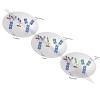
B cells use unconventional strategies for the production of a seemingly unlimited number of antibodies from a very limited amount of DNA. These methods dramatically increase the likelihood of producing proteins that cannot fold or assemble appropriately. B cells are therefore particularly dependent on ‘quality control’ mechanisms to oversee antibody production. ...
21-Dec-2009
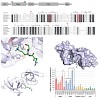
DNA methylation and histone modifications play a central role in the epigenetic regulation of gene expression and cell differentiation. Recently, Np95 (also known as UHRF1 or ICBP90) has been found to interact with Dnmt1 and to bind hemimethylated DNA, indicating together with genetic studies a central role in the maintenance of DNA methylation. Using in vitro ...
15-Dec-2009
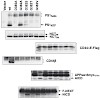
γ-Secretase is a pivotal intramembrane-cleaving protease complex and important drug target for Alzheimer's disease. The protease not only releases small peptides, such as the amyloid-β peptide, which drives Alzheimer's disease pathogenesis, but also intracellular domains, which can have critical functions in nuclear signaling. Unlike typical aspartyl proteases, ...
13-Dec-2009

Protein conformation is critically linked to function and often controlled by interactions with regulatory factors. Here we report the selection of camelid-derived single-domain antibodies (nanobodies) that modulate the conformation and spectral properties of the green fluorescent protein (GFP). One nanobody could reversibly reduce GFP fluorescence by a factor of ...
11-Dec-2009
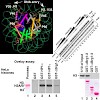
The heterochromatin-enriched HP1 proteins play a critical role in regulation of transcription. These proteins contain two related domains known as the chromo- and the chromoshadow-domain. The chromo-domain binds histone H3 tails methylated on lysine 9. However, in vivo and in vitro experiments have shown that the affinity of HP1 proteins to native methylated ...
10-Dec-2009
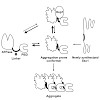
The co-chaperone Hep1 is required to prevent the aggregation of mitochondrial Hsp70 proteins. We have analyzed the interaction of Hep1 with mitochondrial Hsp70 (Ssc1) and the determinants in Ssc1 which make it prone to aggregation. The ATPase and the peptide binding domain (PBD) of Hsp70 proteins are connected by a linker segment that mediates interdomain ...
04-Dec-2009
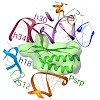
Plastid-specific ribosomal proteins (PSRPs) have been proposed to play roles in the light-dependent regulation of chloroplast translation. Here we demonstrate that PSRP1 is not a bona fide ribosomal protein, but rather a functional homologue of the Escherichia coli cold-shock protein pY. Three-dimensional Cryo-electron microscopic (Cryo-EM) reconstructions reveal ...
04-Dec-2009

Expression of the Escherichia coli tryptophanase operon depends on ribosome stalling during translation of the upstream TnaC leader peptide, a process for which interactions between the TnaC nascent chain and the ribosomal exit tunnel are critical. We determined a 5.8 angstrom–resolution cryo–electron microscopy and single-particle reconstruction of a ...
Structure of Monomeric Yeast and Mammalian Sec61 Complexes Interacting with the Translating Ribosome
04-Dec-2009
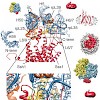
The trimeric Sec61/SecY complex is a protein-conducting channel (PCC) for secretory and membrane proteins. Although Sec complexes can form oligomers, it has been suggested that a single copy may serve as an active PCC. We determined subnanometer-resolution cryo–electron microscopy structures of eukaryotic ribosome-Sec61 complexes. In combination with biochemical ...
01-Dec-2009
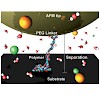
A method based on atomic force microscopy is used to delineate the properties that determine single-molecule adhesion onto solid substrates in aqueous environment. Hydrophobicity as well as electrical properties of the substrate and the polymer are varied. In addition, the influence of the solvent composition, in particular the effect of ions, on the molecular ...
01-Dec-2009
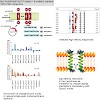
Folding and oligomerization of integral membrane proteins frequently depend on specific interactions of transmembrane helices. Interacting amino acids of helix-helix interfaces may form complex motifs and exert different types of molecular forces. Here, a set of strongly self-interacting transmembrane domains (TMDs), as isolated from a combinatorial library, was ...
01-Dec-2009
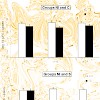
Preexisting antivector immunity can severely compromise the ability of Salmonella enterica serovar Typhimurium live vaccines to induce protective CD8 T-cell frequencies after type III secretion system-mediated heterologous protein translocation in orally immunized mice. To circumvent this problem, we injected CpG DNA admixed to the immunodominant p60217-225 ...
01-Dec-2009
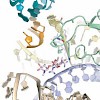
Protein synthesis is one of the major targets in the cell for antibiotics. This review endeavors to provide a comprehensive “post-ribosome structure” A–Z of the huge diversity of antibiotics that target the bacterial translation apparatus, with an emphasis on correlating the vast wealth of biochemical data with more recently available ribosome structures, in ...
25-Nov-2009
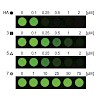
The antibacterial activity of hygromycin A (HA) arises from protein synthesis inhibition and is dependent upon a methylenedioxy bridged-aminocyclitol moiety. Selective gene deletions and chemical complementation in Streptomyces hygroscopicus NRRL 2388 showed that the hyg18 and hyg25 gene products, proposed to generate a myo-inositol intermediate, are dispensable ...
23-Nov-2009
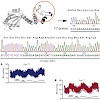
Hypertension and its complications represent leading causes of morbidity and mortality. Although the cause of hypertension is unknown in most patients, genetic factors are recognized as contributing significantly to an individual’s lifetime risk of developing the condition. Here, we investigated the role of the G protein regulator phosducin (Pdc) in hypertension. ...
16-Nov-2009
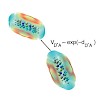
Limits and optimization of a solar energy conversion system consisting of a photochemical charge separating unit coupled to an energy storage state are explored by multi-objective genetic algorithms. Pareto fronts were evaluated to obtain information about the ideal parameter combinations, guaranteeing highest efficiency. The light absorbing and charge separating ...
15-Nov-2009
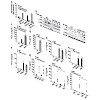
Interleukin 1beta (IL-1beta) is a potent proinflammatory factor during viral infection. Its production is tightly controlled by transcription of Il1b dependent on the transcription factor NF-κB and subsequent processing of pro-IL-1betaby an inflammasome. However, the sensors and mechanisms that facilitate RNA virus–induced production of IL-1beta are not well ...
15-Nov-2009
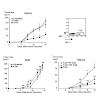
RNA oligonucleotides containing immune-activating sequences promote the development of cytotoxic T cell and B cell responses to Ag. In this study, we show for the first time that immunostimulatory RNA oligonucleotides induce a NK cell response that prevents growth of NK-sensitive tumors. Treatment of mice with immunostimulatory RNA oligonucleotides activates NK ...
13-Nov-2009
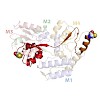
In the past decade, single-molecule force spectroscopy has provided new insights into the key interactions stabilizing folded proteins. A few recent studies probing the effects of ligand binding on mechanical protein stability have come to quite different conclusions. While some proteins seem to be stabilized considerably by a bound ligand, others appear to be ...
11-Nov-2009
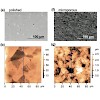
The nanostructure of materials is supposed to affect polymer adhesion at the solid/liquid interface by variations of the exposed surface area. In contrast, our studies on the nanotribology of single recombinant spider silk proteins onto smooth and rough surfaces made of surgical stainless steel show no effect of the surface morphology. This is explained by the ...
10-Nov-2009

Closing a gap in the literature, this handbook gathers all the information on single particle tracking and single molecule energy transfer. It covers all aspects of this hot and modern topic, from detecting virus entry to membrane diffusion, and from protein folding using spFRET to coupled dye systems, as well recent achievements in the field. Throughout, the ...
10-Nov-2009
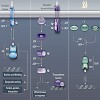
Histidine protein kinases and serine, threonine, or tyrosine protein kinases play essential roles in signal transduction in prokaryotes and eukaryotes. A third type of protein kinase, an arginine protein kinase, has been identified. McsB of Bacillus subtilis hosphorylates the heat shock transcriptional regulator CtsR and can be regarded as the founding member of ...
09-Nov-2009
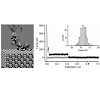
The adhesion of polypeptides and proteins at interfaces is important for a wide variety of systems—from the adhesion onto vessels during their production process over functional coatings to protein–membrane interactions in single cells. Herein, we apply an atomic-force-microscopy-based single-molecule method and poly-D-tyrosine to determine the adhesion strength ...
09-Nov-2009
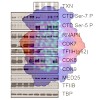
The largest subunit of RNA polymerase II (RNAPII) carboxy-terminal heptarepeat domain (CTD) is subject to phosphorylation during initiation and elongation of transcription by RNA polymerase II. Here we study the molecular mechanisms leading to phosphorylation of serine-7 (ser-7) in the human enzyme. Ser-7 becomes phosphorylated before initiation of transcription ...
06-Nov-2009
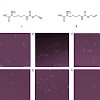
Eukaryotic proteins and in particular cell-surface proteins are frequently glycosylated, which has fueled the interest of chemist to develop new methods for the synthesis of glycosylated proteins. Protein glycosylation is essential for the proper function of the respective proteins and in the case of glycosylated protein therapeutics, such as erythropoietin, the ...
06-Nov-2009
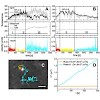
Assembly and release of human immunodeficiency virus (HIV) occur at the plasma membrane of infected cells and are driven by the Gag polyprotein. Previous studies analyzed viral morphogenesis using biochemical methods and static images, while dynamic and kinetic information has been lacking until very recently. Using a combination of wide-field and total internal ...
04-Nov-2009
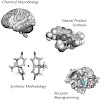
Chemical Biology: Photosensitive reaction opens or shuts potassium's flow. Drugs that are modulated by light may have a more controllable cousin on the horizon. Researchers led by Dirk Trauner, a chemist at the University of Munich, have figured out the mechanism by which molecules with the ability to block voltage-gated ion channels can be turned on and off ...
01-Nov-2009
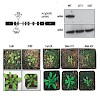
All members of the YidC/Oxa1/Alb3 protein family are evolutionarily conserved and appear to function in membrane protein integration and protein complex stabilization. Here, we report on a second thylakoidal isoform of Alb3, named Alb4. Analysis of Arabidopsis knockout mutant lines shows that Alb4 is required in assembly and/or stability of the CF1CF0–ATP ...
01-Nov-2009

The adult mouse subependymal zone (SEZ) harbors neural stem cells that are thought to exclusively generate GABAergic interneurons of the olfactory bulb. We examined the adult generation of glutamatergic juxtaglomerular neurons, which had dendritic arborizations that projected into adjacent glomeruli, identifying them as short-axon cells. Fate mapping revealed ...
30-Oct-2009

Most thiopeptide antibiotics target the translational machinery: thiostrepton (ThS) and nosiheptide (NoS) target the ribosome and inhibit translation factor function, whereas GE2270A/T binds to the elongation factor EF-Tu and prevents ternary complex formation. We have used several in vitro translational machinery assays to screen a library of thiopeptide ...
Measurement of replication structures at the nanometer scale using super-resolution light microscopy
28-Oct-2009

DNA replication, similar to other cellular processes, occurs within dynamic macromolecular structures. Any comprehensive understanding ultimately requires quantitative data to establish and test models of genome duplication. We used two different super-resolution light microscopy techniques to directly measure and compare the size and numbers of replication foci ...
23-Oct-2009
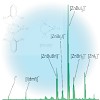
Solutions of butylzinc iodide in tetrahydrofuran, acetonitrile, and N,N-dimethylformamide were analyzed by electrospray ionization mass spectrometry. In all cases, microsolvated butylzinc cations [ZnBu(solvent)n]+, n=1-3, were detected. The parallel observation of the butylzincate anion [ZnBuI2]- suggests that these ions result from disproportionation of neutral ...
22-Oct-2009
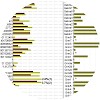
Membrane proteomics is challenging because the desirable strong detergents are incompatible with downstream analysis. Recently, we demonstrated efficient removal of SDS by the filter aided sample preparation method (FASP). Here we combine FASP with our previously described small-scale membrane enrichment protocol. Analysis of a single mouse hippocampus enables ...
21-Oct-2009

The PUR protein family is a distinct and highly conserved class that is characterized by its sequence-specific RNA- and DNA-binding. Its best-studied family member, Pur-α, acts as a transcriptional regulator, as host factor for viral replication, and as cofactor for mRNP localization in dendrites. Pur-α-deficient mice show severe neurologic defects and die after ...
19-Oct-2009

Many biopharmaceuticals comprise small proteins that are quickly eliminated from the body. CIPSM PI and board member Arne Skerra and his new spin-off XL-protein GmbH combine such small proteins with a kind of molecular balloon that swells and thus prolongs the half-life of these proteins in the body. The CIPSM spin-off XL-protein GmbH has now started to further ...
16-Oct-2009
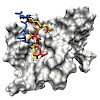
Molecular docking programs play an important role in drug development and many well-established methods exist. However, there are two situations for which the performance of most approaches is still not satisfactory, namely inclusion of receptor flexibility and docking of large, flexible ligands like peptides. In this publication a new approach is presented for ...
12-Oct-2009
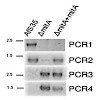
GDP-mannose:inositol-phosphorylceramide (MIPC)-derived glycosphingolipids are important pathogen-associated molecular patterns (PAMP) of Candida albicans and according to recently published data also of Aspergillus fumigatus. MIPC transferases are essential for the synthesis of MIPC, but have so far been studied only in Saccharomyces cerevisiae and C. albicans. ...
A Photolabile Linker for the Mild and Selective Cleavage of Enriched Biomolecules from Solid Support
12-Oct-2009
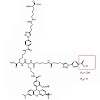
Selective release of enriched biomolecules from solid support is a desirable goal in proteomic and metabolomic studies. Here we demonstrate that photocleavage of a light-sensitive phenacyl ester bond is a suitable alternative cleavage strategy for the selective release of enriched biomolecules form avidin beads circumventing the disadvantages of conventional heat ...
10-Oct-2009
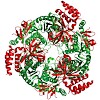
The RNA exosome is a multisubunit exonuclease involved in numerous RNA maturation and degradation processes. Exosomes are found in eukaryotes and archaea and are related to bacterial polynucleotide phosphorylates. Over the past years structural and biochemical analysis revealed that archaeal exosomes have a large processing chamber with three phosphorolytic ...
09-Oct-2009
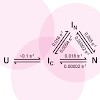
Antibodies are modular proteins consisting of domains that exhibit a β-sandwich structure, the so-called immunoglobulin fold. Despite structural similarity, differences in folding and stability exist between different domains. In particular, the variable domain of the light chain VL is unusual as it is associated with misfolding diseases, including the pathologic ...
09-Oct-2009
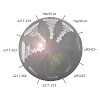
Hsp90 is an ATP-dependent molecular chaperone which assists the maturation of a large set of target proteins. Members of the highly conserved Hsp90 family are found from bacteria to higher eukaryotes, with homologues in different organelles. The core architecture of Hsp90 is defined by the N-terminal ATP-binding domain, followed by the middle domain and the ...
05-Oct-2009

CIPSM is very proud Thomas Cremer was honored by the prestigious Schleiden Medal of the German Academy of Sciences Leopoldina for his outstanding scientific work on the topograhy of chromosomes in the nucleus of Eucaryota. German press release: Die Deutsche Akademie der Naturforscher Leopoldina - Nationale Akademie der Wissenschaften würdigt die ...
03-Oct-2009
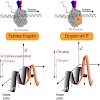
Most of the essential cellular processes such as polymerisation reactions, gene expression and regulation are governed by mechanical processes. Controlled mechanical investigations of these processes are therefore required in order to take our understanding of molecular biology to the next level. Single-molecule manipulation and force spectroscopy have over the ...
02-Oct-2009

The translational apparatus is one of the major targets for antibiotics in the bacterial cell. Antibiotics predominantly interact with the functional centers of the ribosome, namely the messenger RNA (mRNA)-transfer RNA (tRNA) decoding region on the 30S subunit, the peptidyltransferase center on the 50S subunit, or the ribosomal exit tunnel through which the ...
02-Oct-2009
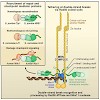
The Mre11-Rad50-Nbs1 (MRN) complex senses DNA double-strand breaks and recruits different repair pathway and checkpoint proteins to break foci. Two new studies (Williams et al., 2009; Lloyd et al., 2009,Williams et al., 2009; Lloyd et al., 2009) identify Nbs1 as a key factor in this process and reveal how an N-terminal protein recruitment module in Nbs1 binds to ...
02-Oct-2009
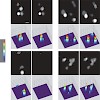
Recent studies have indicated that nuclear protein of 95 kDa (Np95) is essential for maintaining genomic methylation by recruiting DNA methyltransferase (Dnmt) 1 to hemi-methylated sites. Here, we show that Np95 interacts more strongly with regulatory domains of the de novo methyltransferases Dnmt3a and Dnmt3b. To investigate possible functions, we developed an ...
01-Oct-2009

Tear lipocalin (TLC) with the bound artificial ligand 1,4-butanediol has been crystallized in space group P21 with four protein molecules in the asymmetric unit and its X-ray structure has been solved at 2.6 Å resolution. TLC is a member of the lipocalin family that binds ligands with diverse chemical structures, such as fatty acids, phospholipids and ...
01-Oct-2009
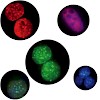
The cooperation "Experimental and theoretical methods for dissecting the dynamics of epigenetic gene silencing in living cells" between Prof. Heinrich Leonhardt's and Prof. Gunnar Schotta's CIPSM groups and scientists from the University of Heidelberg will be supported for the next three years by the "New methods in systembiology" program of the BMBF financially. ...
01-Oct-2009
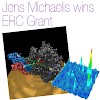
CIPSM-Investigator Jens Michaelis has done it! Jens received a grant of nearly 1,5 million Euros from the European Research Council for the next five years. Jens will explore the understanding of the molecular mechanism of nucleosome remodelling using single-molecule fluorescence resonance energy transfer (FRET). In eukaryotic cells the DNA is packaged into ...
01-Oct-2009

With over 47,000 citations, the sequence search method BLAST has been an essential tool in biological research since its development in 1990. By accounting for the influence of sequence context on the mutation probabilities of amino acids, context-specific BLAST (CS-BLAST) achieves two-fold higher sensitivity for distantly related protein sequences at the same ...
30-Sep-2009
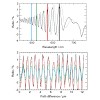
Femtosecond stimulated Raman microscopy (FSRM) is an upcoming technique in nonlinear microscopy which facilitates rapid chemical mapping. It employs femtosecond white-light pulses as probe pulses and intense picosecond pulses as pump pulses. Stimulated Raman scattering (SRS) occurs at the focus of a scanning microscope. Chemical constituents in the sample are ...
30-Sep-2009

In femtosecond stimulated Raman microscopy (FSRM) a spectrally broad pulse (Raman probe) and a spectrally narrow pulse (Raman pump) interact in a sample and thereby generate a Raman spectrum of the focal volume. Here a novel light source for FSRM is presented. It consists of an 8-fs laser (repetition rate of 75 MHz) operating as Raman probe. A Yb3+ based fiber ...
29-Sep-2009
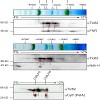
Translocation of nuclear-encoded preproteins across the inner envelope of chloroplasts is catalyzed by the Tic translocon, consisting of Tic110, Tic40, Tic62, Tic55, Tic32, Tic20, and Tic22. Tic62 was proposed to act as a redox sensor of the complex because of its redox-dependent shuttling between envelope and stroma and its specific interaction with the ...
25-Sep-2009
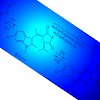
The dependence of the pericyclic ring-opening reaction of indolylfulgides and indolylfulgimides on excess energy is investigated by quantum efficiency measurements and by ultrafast spectroscopy. The ring-opening reaction shows a pronounced improvement of reaction efficiency up to a factor of 6, when excess energy is available either by increasing the temperature ...
18-Sep-2009

The translational apparatus is one of the major targets for antibiotics in the bacterial cell. Antibiotics predominantly interact with the functional centers of the ribosome, namely the messenger RNA (mRNA)-transfer RNA (tRNA) decoding region on the 30S subunit, the peptidyltransferase center on the 50S subunit, or the ribosomal exit tunnel through which the ...
17-Sep-2009
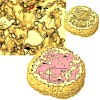
The nuclear architecture is considered an important contributor to genome function. Although the fine structural features of the cell nucleus have been investigated extensively by means of ultrastructural cytochemistry, mainly on ultrathin sections in two dimensions (2D), there was a of lack routine methods for a rapid reconstruction of three-dimensional (3D) ...
17-Sep-2009
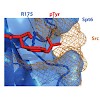
Termination of RNA polymerase (Pol) II transcription in vivo requires the 5’-RNA exonuclease Rat1. It was proposed that Rat1 degrades RNA from the 5’-end that is created by transcript cleavage, catches up with elongating Pol II, and acts like a torpedo that removes Pol II from DNA. Here we test the torpedo model in an in vitro system based on bead-coupled Pol II ...
16-Sep-2009
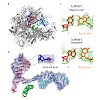
Structure-function analysis has revealed the mechanism of yeast RNA polymerase II transcription at 8-oxoguanine (8-oxoG), the major DNA lesion resulting from oxidative stress. When polymerase II encounters 8-oxoG in the DNA template strand, it can misincorporate adenine, which forms a Hoogsteen bp with 8-oxoG at the active center. This requires rotation of the ...
16-Sep-2009
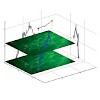
We developed a new method for real-time, three-dimensional tracking of fluorescent particles. The instrument is based on a laser-scanning confocal microscope where the focus of the laser beam is scanned or orbited around the particle. Two confocal pinholes are used to simultaneously monitor regions immediately above and below the particle and a feedback loop is ...
13-Sep-2009
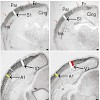
An important feature of the cerebral cortex is its layered organization, which is modulated in an area-specific manner. We found that the transcription factor AP2gamma regulates laminar fate in a region-specific manner. Deletion of AP2gamma (also known as Tcfap2c) during development resulted in a specific reduction of upper layer neurons in the occipital cortex, ...
12-Sep-2009
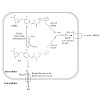
Hygromycin A (HA) is an aminocyclitol antibiotic produced and excreted by Streptomyces hygroscopicus. Deletion of hyg26 from the hygromycin A biosynthetic gene cluster has previously been shown to result in a mutant that produces 5''-dihydrohygromycin A (DHHA). We report herein on the purification and characterization of Hyg26 expressed in Escherichia coli. The ...
11-Sep-2009

Yeah, the CIPSM football team won the 2009 ScieKickIn football tournament. We thank its members around Prof. Axel Imhof for their excellent performance and passion. german press release
11-Sep-2009
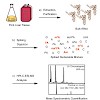
Modifications make a difference: An isotope-based mass spectrometry method allows the facile and quantitative analysis of modified tRNA nucleosides in various types of cells. This method could be capable of distinguishing between individual cell lines as well as between healthy tissue and cancer cells.
11-Sep-2009

The natural product syringolin A (SylA) is a potent proteasome inhibitor with promising anticancer activities. To further investigate its potential as a lead structure, selectivity profiling with cell lysates was performed. At therapeutic concentrations, a rhodamine-tagged SylA derivative selectively bound to the 20 S proteasome active sites without detectable ...
08-Sep-2009

The DNA of a cell is continuously exposed to numerous endogenous and exogenous factors. The resulting DNA damage can lead to mutations or cell death. Some of the major DNA lesions are generated by the reaction of alkylating reagents with DNAbases. The alkylated reaction products can arise endogenously from cellular alkylating reagents as Sadenosylmethionine or ...
02-Sep-2009
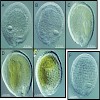
OBG-like GTPases, a subfamily of P-loop GTPases, have divers and important functions in bacteria, including initiation of sporulation, DNA replication, and protein translation. Homologs of the Bacillus subtilis spo0B GTP-binding protein (OBG) can be found in plants and algae but their specific function in these organisms has not yet been elucidated. Here, it is ...
01-Sep-2009
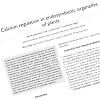
In plant cells calcium-dependent signaling pathways are involved in a large array of biological processes in response to hormones, biotic/abiotic stress signals and a variety of developmental cues. This is generally achieved through binding of calcium to diverse calcium-sensing proteins, which subsequently control downstream events by activating or inhibiting ...
01-Sep-2009

Elimination of redundant synapses and strengthening of the surviving ones are crucial steps in the development of the nervous system. Both processes can be readily followed at the climbing fiber to Purkinje cell synapse in the cerebellum. Shortly after birth, around five equally strong climbing fiber synapses are established. Subsequently, one of these five ...
31-Aug-2009

UV-light irradiation induces the formation of highly mutagenic lesions in DNA, such as cis-syn cyclobutane pyrimidine dimers (CPD photoproducts), pyrimidine(6-4)pyrimidone photoproducts ((6-4) photoproducts) and their Dewar valence isomers ((Dew) photoproducts). Here we describe the synthesis of defined DNA strands containing these lesions by direct irradiation. ...
28-Aug-2009
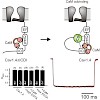
Cav1.4 channels are unique among the high voltage-activated (HVA) Ca2+ channel family because they completely lack Ca2+-dependent inactivation (CDI) and display very slow voltage-dependent inactivation (VDI). Both properties are of crucial importance in ribbon synapses of retinal photoreceptors and bipolar cells where sustained Ca2+ influx through Cav1.4 channels ...
27-Aug-2009
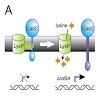
Bacteria sense environmental stimuli and transduce this information to cytoplasmic components of the signal transduction machinery to cope with and to adapt to ever changing conditions. Hence, bacteria are equipped with numerous membrane-integrated proteins responsible for sensing such as histidine kinases, chemoreceptors and ToxR-like proteins. There is ...
26-Aug-2009
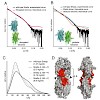
In eukaryotic cells, dozens to hundreds of different mRNAs are localized by specialized motor-dependent transport complexes. One of the best-studied examples for directional mRNA transport is the localization of ASH1 mRNA in Saccharomyces cerevisiae. For transport, ASH1 mRNA is bound by the unusual RNA-binding protein She2p. Although previous results indicated ...
26-Aug-2009

The dosage compensation complex (DCC) in Drosophila globally increases transcription from the X chromosome in males to compensate for its monosomy.We discovered a male-specific conformation of the X chromosome that depends on the associations of high-affinity binding sites (HAS) of the DCC. The core DCC subunits MSL1–MSL2 are responsible for this male-specific ...
25-Aug-2009
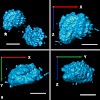
Quantum dots (Qdots) are semiconductor nanocrystals, which are photo-stable, show bright fluorescence with narrow, symmetric emission spectra and are available in multiple resolvable colors. We established a FISH protocol for the simultaneous visualization of up to 6 different DNA probes differentially labeled with Qdots and with conventional organic ...
21-Aug-2009
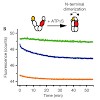
Heat shock protein 90 (Hsp90) is an abundant, dimeric ATP-dependent molecular chaperone, and ATPase activity is essential for its in vivo functions. S-nitrosylation of a residue located in the carboxy-terminal domain has been shown to affect Hsp90 activity in vivo. To understand how variation of a specific amino acid far away from the amino-terminal ATP-binding ...
21-Aug-2009
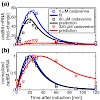
The analysis of stress response systems in microorganisms can reveal molecular strategies for regulatory control and adaptation. In this study, we focused on the Cad module, a subsystem of Escherichia coli’s response to acidic stress that is conditionally activated at low pH only when lysine is available. When expressed, the Cad system counteracts the elevated H+ ...
19-Aug-2009
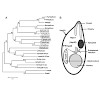
Small heat shock proteins (sHsps) are ubiquitous molecular chaperones which prevent the nonspecific aggregation of non-native proteins. Five potential sHsps exist in the parasite Toxoplasma gondii. They are located in different intracellular compartments including mitochondria and are differentially expressed during the parasite's life cycle. Here, we analyzed ...
19-Aug-2009
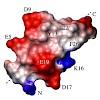
Efficient formation of specific intermolecular interactions is essential for self-assembly of biological structures. The foldon domain is an evolutionarily optimized trimerization module required for assembly of the large, trimeric structural protein fibritin from phage T4. Monomers consisting of the 27 amino acids comprising a single foldon domain subunit ...
18-Aug-2009
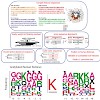
Acetylation is a well-studied posttranslational modification that has been associated with a broad spectrum of biological processes, notably gene regulation. Many studies have contributed to our knowledge of the enzymology underlying acetylation, including efforts to understand the molecular mechanism of substrate recognition by several acetyltransferases, but ...
13-Aug-2009
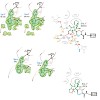
Many marketed drugs contain fluorine, reflecting its ability to modulate a variety of biological responses. The unique 20S proteasome inhibition profile of fluorosalinosporamide compared to chlorinated anticancer agent salinosporamide A (NPI-0052) is exemplary and relates to each halogen’s leaving group potential. Crystal structures of fluoro-, hydroxy-, and ...
10-Aug-2009
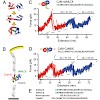
The eukaryotic signaling protein calmodulin (CaM) can bind to more than 300 known target proteins to regulate numerous functions in our body in a calcium-dependent manner. How CaM distinguishes between these various targets is still largely unknown. Here, we investigate fluctuations of the complex formation of CaM and its target peptide sequences using ...
07-Aug-2009

We demonstrate the ability to engineer complex shapes that twist and curve at the nanoscale from DNA. Through programmable self-assembly, strands of DNA are directed to form a custom-shaped bundle of tightly cross-linked double helices, arrayed in parallel to their helical axes. Targeted insertions and deletions of base pairs cause the DNA bundles to develop ...
06-Aug-2009

Quantum efficiencies and ultrafast dynamics of the ring-closure and ring-opening reaction of a trifluorinated dicyclopropyl indolylfulgide with improved photostability are investigated by stationary and ultrafast absorption spectroscopy. The ring-closure reaction occurs on the time scale of 200 fs and is found to be temperature independent (T = 287–333 K). ...
04-Aug-2009
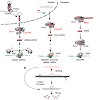
Transposons are mobile genetic elements found in the hereditary material of humans and other organisms. They can replicate and the new copies can insert at novel sites in the genome. Because this threatens the whole organism, molecular mechanisms have evolved which can repress transposon activity. CIPSM-Professor Klaus Förstemann of the Gene Center of ...
04-Aug-2009
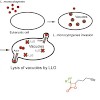
The increasing emergence of multiresistant bacterial pathogens represents a dramatic global health problem. One major reason for this dilemma is the high selective pressure that is exerted on bacteria by classical antibiotic therapies, leading to a steady increase in the number of strains resistant to the majority of all currently available antibiotic drugs. In ...
03-Aug-2009
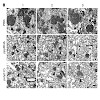
The retinoic acid–inducible gene I (RIG-I) and melanoma differentiation–associated antigen 5 (MDA-5) helicases sense viral RNA in infected cells and initiate antiviral responses such as the production of type I IFNs. Here we have shown that RIG-I and MDA-5 also initiate a proapoptotic signaling pathway that is independent of type I IFNs. In human melanoma cells, ...
01-Aug-2009
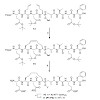
Cyclization of recently reported linear phosphino dipeptide isostere inhibitors of BACE1 via side chain olefin metathesis yielded macrocyclic BACE1 inhibitors. The most potent compound II-P1 (IC50 of 47 nM) and the corresponding linear analog I were tested for serum stability. The approach led to three times prolonged half life serum stability of 44 min for the ...
01-Aug-2009
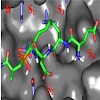
Cyclization of recently reported linear phosphino dipeptide isostere inhibitors of BACE1 via side chain olefin metathesis yielded macrocyclic BACE1 inhibitors. The most potent compound II-P1 (IC50 of 47 nM) and the corresponding linear analog I were tested for serum stability. The approach led to three times prolonged half life serum stability of 44 min for the ...
28-Jul-2009

Several factors regulate plant organ growth polarity. tortifolia2 (tor2), a right-handed helical growth mutant, has a conservative replacement of Arg-2 with Lys in the {alpha}-tubulin 4 protein. Based on a published high-resolution (2.89 Å) tubulin structure, we predict that Arg-2 of {alpha}-tubulin forms hydrogen bonds with the GTPase domain of {beta}-tubulin, ...
28-Jul-2009
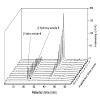
A new photoinducible single electron donor has been developed, which, when linked to thymidine, is shown to be an efficient ground state reducing agent in DNA; the donor can be activated at wavelengths where standard DNA does not absorb.
27-Jul-2009
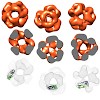
alpha-Crystallins are molecular chaperones that protect vertebrate eye lens proteins from detrimental protein aggregation. alpha B-Crystallin, 1 of the 2 alpha-crystallin isoforms, is also associated with myopathies and neuropathological diseases. Despite the importance of alpha-crystallins in protein homeostasis, only little is known about their quaternary ...
25-Jul-2009
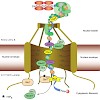
MRNA export is an indispensable step during the complex process of eukaryotic gene expression: the mRNA, created by RNA polymerase II in the nucleus, has to be transported to the cytoplasm, where the ribosomes are responsible for the synthesis of the encoded protein. This transport process is not restricted to the simple passage of the mRNA through the nuclear ...
23-Jul-2009
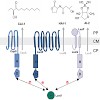
Quorum sensing (QS) refers to the ability of bacterial populations to read out the local environment for cell density and to collectively activate gene expression. Vibrio harveyi, one of the best characterized model organisms in QS, was used to address the question how single cells behave within a QS-activated community in a homogeneous environment. Analysis of ...
21-Jul-2009
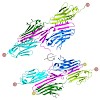
Mechanical stability of bonds and protein interactions has recently become accessible through single molecule mechanical experiments. So far, mechanical information about molecular bond mechanics has been largely limited to a single direction of force application. However, mechanical force acts as a vector in space and hence mechanical stability should depend on ...
20-Jul-2009
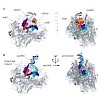
Crystallographic studies of the RNA polymerase II (Pol II) elongation complex (EC) revealed the locations of downstream DNA and the DNA-RNA hybrid, but not the course of the nontemplate DNA strand in the transcription bubble and the upstream DNA duplex. Here we used single-molecule Fluorescence Resonance Energy Transfer (smFRET) experiments to locate nontemplate ...
20-Jul-2009

Crystallographic studies of the RNA polymerase II (Pol II) elongation complex (EC) revealed the locations of downstream DNA and the DNA-RNA hybrid, but not the course of the nontemplate DNA strand in the transcription bubble and the upstream DNA duplex. Here we used singlemolecule Fluorescence Resonance Energy Transfer (smFRET) experiments to locate nontemplate ...
15-Jul-2009
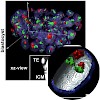
Gene-dense chromosome territories (CTs) are typically located more interior, gene-poor CTs more peripheral in mammalian cell nuclei. Here, we show that this gene-density correlated CT positioning holds for the most gene-rich and gene-poor bovine chromosomes 19 and 20, respectively, in bovine fibroblast and lymphocyte nuclei. In order to determine the period at ...
13-Jul-2009
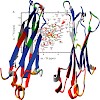
The formation of multicellular organisms requires concerted action by cells, which alter their adhesive and migratory behaviors. Cell adhesion and migration are tightly regulated by intra- and extracellular signals, which are conveyed through the cellular membrane by specialized receptors known as integrins.[1] Integrins are the starting point of a variety of ...
09-Jul-2009
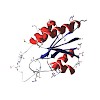
The KdpD/KdpE two-component system of Escherichia coli regulates expression of the kdpFABC operon encoding the high affinity K+ transport system KdpFABC. The input domain of KdpD comprises a domain that belongs to the family of universal stress proteins (Usp). It has been previously demonstrated that UspC binds to this domain, resulting in KdpD/KdpE scaffolding ...
09-Jul-2009
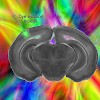
Eye-opening represents a turning point in the function of the visual cortex. Before eye-opening, the visual cortex is largely devoid of sensory inputs and neuronal activities are generated intrinsically. After eye-opening, the cortex starts to integrate visual information. Here we used in vivo two-photon calcium imaging to explore the developmental changes of the ...
09-Jul-2009
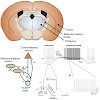
Hyperpolarization-activated cyclic nucleotide-gated (HCN) channels comprise a small subfamily of proteins within the superfamily of pore-loop cation channels. In mammals, the HCN channel family comprises four members (HCN1-4) that are expressed in heart and nervous system. The current produced by HCN channels has been known as Ih (or If or Iq). Ih has also been ...
08-Jul-2009
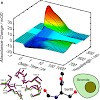
Studies have shown that trans-cis isomerization of retinal is the primary photoreaction in the photocycle of the light-driven proton pump bacteriorhodopsin (BR) from Halobacterium salinarum, as well as in the photocycle of the chloride pump halorhodopsin (HR). The transmembrane proteins HR and BR show extensive structural similarities, but differ in the ...
07-Jul-2009
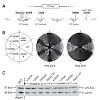
The mitochondrial dynamin-like GTPase Mgm1 exists as a long (l-Mgm1) and a short isoform (s-Mgm1). They both are essential for mitochondrial fusion. Here we show that the isoforms interact in a homotypic and heterotypic manner. Their submitochondrial distribution between inner boundary membrane and cristae was markedly different. Overexpression of l-Mgm1 exerts a ...
06-Jul-2009
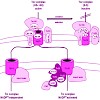
The import of nuclear-encoded preproteins is necessary to maintain chloroplast function. The recognition and transfer of most precursor proteins across the chloroplast envelopes are facilitated by two membrane-inserted protein complexes, the translocons of the chloroplast outer and inner envelope (Toc and Tic complexes, respectively). Several signals have been ...
03-Jul-2009

Post-translational histone modifications have essential roles in controlling nuclear processes; however, the specific mechanisms regulating these modifications and their combinatorial activities remain elusive. Cyclin-dependent kinase 9 (CDK9) regulates gene expression by phosphorylating transcriptional regulatory proteins, including the RNA polymerase II ...
02-Jul-2009
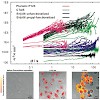
We apply mesoporous thin silica films with nanometer-sized pores as drug carriers and incorporate the widely used anticancer drug Doxorubicin. Through single-molecule based measurements, we gain mechanistic insights into the drug diffusion inside the mesoporous film, which governs the drug-delivery at the target-site. Drug dynamics inside the nanopores is ...
02-Jul-2009

The ATPase retinoid acid-inducible gene (RIG)-I senses viral RNA in the cytoplasm of infected cells and subsequently activates cellular antiviral defense mechanisms. RIG-I recognizes molecular structures that discriminate viral from host RNA. Here, we show that RIG-I ligands require base-paired structures in conjunction with a free 5′-triphosphate to trigger ...
01-Jul-2009

Cyclic nucleotide-gated (CNG) channels are ion channels which are activated by the binding of cGMP or cAMP. The channels are important cellular switches which transduce changes in intracellular concentrations of cyclic nucleotides into changes of the membrane potential and the Ca2+ concentration. CNG channels play a central role in the signal transduction ...
01-Jul-2009
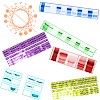
Members of the AAA+-ATPase superfamily (ATPases associated with various cellular activities) are found in all kingdoms of life and they are involved in very diverse cellular processes, including protein degradation, membrane fusion or cell division. The Arabidopsis genome encodes approximately 140 different proteins that are putative members of this superfamily, ...
30-Jun-2009
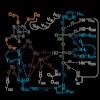
Eukaryotes and most prokaryotes require isopentenyl diphosphate (IPP) and dimethylallyl diphosphate (DMAPP) as biosynthetic precursors of terpenes. Whereas animals generate these essential metabolites via the mevalonate pathway,[1] many human pathogens including Plasmodium falciparum and Mycobacterium tuberculosis are known to use the more recently identified ...
30-Jun-2009
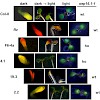
Chloroplast biogenesis in angiosperm plants requires the light-dependent transition from an etioplast stage. A key factor in this process is NADPH:protochlorophyllide oxidoreductase A (PORA), which catalyzes the light-dependent reduction of protochlorophyllide to chlorophyllide. In a recent study the chloroplast outer envelope channel OEP16 was described to be ...
29-Jun-2009
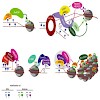
During differentiation and development cells undergo dramatic morphological, and functional changes without any change in the DNA sequence. The underlying changes of gene expression patterns are established and maintained by epigenetic processes. Early mechanistic insights came from the observation that gene activity and repression states correlate with the DNA ...
29-Jun-2009
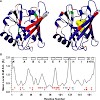
The NMR structure of the 21 kDa lipocalin FluA, which was previously obtained by combinatorial design, elucidates a reshaped binding site specific for the dye fluorescein resulting from 21 side chain replacements with respect to the parental lipocalin, the naturally occurring bilin-binding protein (BBP). As expected, FluA exhibits the lipocalin fold of BBP, ...
28-Jun-2009

Congenital dyserythropoietic anemias (CDAs) are phenotypically and genotypically heterogeneous diseases. CDA type II (CDAII) is the most frequent CDA. It is characterized by ineffective erythropoiesis and by the presence of bi- and multinucleated erythroblasts in bone marrow, with nuclei of equal size and DNA content, suggesting a cytokinesis disturbance5. Other ...
26-Jun-2009
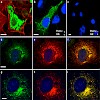
Second messenger-induced Ca2+-release from intracellular stores plays a key role in a multitude of physiological processes. In addition to 1,4,5-inositol trisphosphate (IP3), Ca2+, and cyclic ADP ribose (cADPR) that trigger Ca2+-release from the endoplasmatic reticulum (ER), nicotinic acid adenine dinucleotide phosphate (NAADP) has been identified as a cellular ...
26-Jun-2009
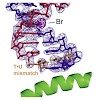
We show that RNA polymerase (Pol) II prevents erroneous transcription in vitro with different strategies that depend on the type of DNA⋅RNA base mismatch. Certain mismatches are efficiently formed but impair RNA extension. Other mismatches allow for RNA extension but are inefficiently formed and efficiently proofread by RNA cleavage. X-ray analysis reveals that a ...
25-Jun-2009
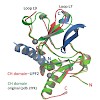
Nonsense-mediated decay (NMD) is a eukaryotic quality control mechanism that degrades mRNAs carrying premature stop codons. In mammalian cells, NMD is triggered when UPF2 bound to UPF3 on a downstream exon junction complex interacts with UPF1 bound to a stalled ribosome. We report structural studies on the interaction between the C-terminal region of UPF2 and ...
19-Jun-2009

CIPSM sponsors the "Alpenforum 2009" which will rock Oberammergau from 26.-28. of June 2009! The event is dedicated to straighten contacts between young chemists and companies. Be there or be square!
19-Jun-2009
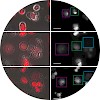
Chromosome shattering has been described as a special form of mitotic catastrophe, which occurs in cells with unrepaired DNA damage. The shattered chromosome phenotype was detected after application of a methanol/acetic acid (MAA) fixation protocol routinely used for the preparation of metaphase spreads. The corresponding phenotype in the living cell and the ...
18-Jun-2009
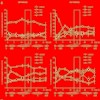
Every cell has to duplicate its entire genome during S-phase of the cell cycle. After replication, the newly synthesized DNA is rapidly assembled into chromatin. The newly assembled chromatin ‘matures’ and adopts a variety of different conformations. This differential packaging of DNA plays an important role for the maintenance of gene expression patterns and has ...
15-Jun-2009
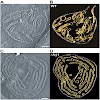
Crista junctions (CJs) are important for mitochondrial organization and function, but the molecular basis of their formation and architecture is obscure. We have identified and characterized a mitochondrial membrane protein in yeast, Fcj1 (formation of CJ protein 1), which is specifically enriched in CJs. Cells lacking Fcj1 lack CJs, exhibit concentric stacks of ...
13-Jun-2009
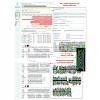
Automated protein structure prediction is becoming a mainstream tool for biological research. This has been fueled by steady improvements of publicly available automated servers over the last decade, in particular their ability to build good homology models for an increasing number of targets by reliably detecting and aligning more and more remotely homologous ...
12-Jun-2009
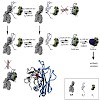
A prerequisite for antibody secretion and function is their assembly into a defined quaternary structure, composed of two heavy and two light chains for IgG. Unassembled heavy chains are actively retained in the endoplasmic reticulum (ER). Here, we show that the CH1 domain of the heavy chain is intrinsically disordered invitro, which sets it apart from other ...
10-Jun-2009

The localization of mRNAs in subcellular compartments is an efficient way to spatially restrict gene expression. Crystal structures of raver1-vinculin reported by Izard and coworkers now suggest a possible mechanism for mRNA localization during the assembly of focal adhesions.
09-Jun-2009
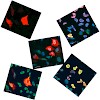
Neuronal and glial deposition of misfolded, proteolytically processed, polyubiquitinated and abnormally phosphorylated C-terminal fragments (CTFs) of the TAR DNA binding protein-43 (TDP-43) is a pathological hallmark of frontotemporal lobar degeneration with ubiquitin positive inclusions (FTLD-U) and certain cases of amyotrophic lateral sclerosis. We demonstrate ...
05-Jun-2009
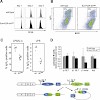
H4K20 methylation is a broad chromatin modification that has been linked with diverse epigenetic functions. Several enzymes target H4K20 methylation, consistent with distinct mono-, di-, and trimethylation states controlling different biological outputs. To analyze the roles of H4K20 methylation states, we generated conditional null alleles for the two Suv4-20h ...
05-Jun-2009
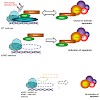
Loss of the of the maintenance methyltransferase xDNMT1 during Xenopus development results in premature transcription and activation of a p53-dependent apoptotic program that accounts for embryo lethality. Here, we show that activation of the apoptotic response is signalled through the methyl-CpG binding protein xMBD4 and the mismatch repair pathway protein ...
02-Jun-2009
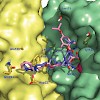
A suitable substitute: All integrin receptors bind their ligands, which contain an aspartate residue, in the metal-ion- dependent adhesion site (MIDAS). So far all attempts to replace the carboxyl group of aspartate with other, pharmacologically favorable isosteric groups have failed. Now it has been shown that a hydroxamic acid group can replace the carboxyl ...
02-Jun-2009
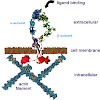
α5β1-integrins play a key role in angiogenesis, the formation of new vessels in tissues that lack them. By serving as receptors for a variety of extracellular matrix proteins containing an arginine-glycine-aspartic acid (RGD) sequence, these integrins mediate migration of endothelial cells into the basement membrane and regulate their growth, survival, and ...
01-Jun-2009
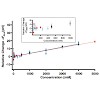
In this paper we probe the influence of surface properties, pH and salt on the adhesion of recombinant spider silk proteins onto solid substrates with single molecule force spectroscopy. A single engineered spider silk protein (monomeric C16 or dimeric (QAQ)8NR3) is covalently bound with one end to an AFM tip, which assures long-time measurements for hours with ...
30-May-2009
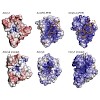
Photolyases repair cytotoxic and mutagenic UV-induced photolesions in DNA by using an amazing light-dependent repair mechanism. It involves light absorption, electron transfer from an excited reduced and deprotonated FADH− to the flipped-out photolesion, followed by the fragmentation of the photolesions. Cryptochromes are highly related proteins that no longer ...
29-May-2009

In order to promote future scientists the best way we can, CIPSM decided to form an own Graduate School. The Graduate School Life Science Munich (LSM) of the Ludwig-Maximilians-University Munich (LMU) offers an international doctoral program in life sciences covering areas of anthropology, biochemistry and cell biology, ecology, evolution, genetics, microbiology, ...
29-May-2009

The LMU-Harvard Young Scientists’ Forum (YSF) seeks to unite Ph.D. students and postdoctoral fellows from the Harvard University and the Ludwig-Maximilians-Universität (LMU) with core faculty from the two universities to create a framework for an interdisciplinary exchange of ideas. This year’s conference entiteled "From Molecules to Organisms" will be held at ...
27-May-2009
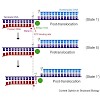
During gene transcription, RNA polymerase (Pol) passes through repetitive cycles of adding a nucleotide to the growing mRNA chain. Here we obtained a movie of the nucleotide addition cycle by combining structural information on different functional states of the Pol II elongation complex (EC). The movie illustrates the two-step loading of the nucleoside ...
26-May-2009
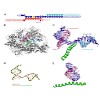
During transcription elongation through chromatin, the Ser2-phosphorylated C-terminal repeat domain of RNA polymerase II binds the C-terminal Src homology 2 (SH2) domain of the nucleosome re-assembly factor Spt6. This SH2 domain is unusual in its specificity to bind phosphoserine, rather than phosphotyrosine and because it is the only SH2 domain in the yeast ...
19-May-2009
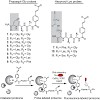
Michael acceptor based natural product derived probes are selective and sensitive chemical tools for the identification and characterization of pathologically relevant enzymes in MRSA.
15-May-2009
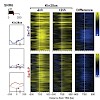
Posttranslational modifications of the carboxyterminal domain (CTD) of the largest subunit of RNA polymerase II (Pol II) specify a molecular recognition code that is deciphered by proteins involved in RNA biogenesis. The CTD is comprised of a repeating heptapeptide (Y1S2P3T4S5P6S7). Recently, phosphorylation of serine 7 was shown to be important for ...
13-May-2009
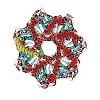
Within 1 or 2 decades, the reputation of membrane-spanning -helices has changed dramatically. Once mostly regarded as dull membrane anchors, transmembrane domains are now recognized as major instigators of protein-protein interaction. These interactions may be of exquisite specificity in mediating assembly of stable membrane protein complexes from cognate ...
13-May-2009
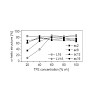
Acylation of proteins is known to mediate membrane attachment and to influence subcellular sorting. Here, we report that acylation can stabilize secondary structure. Circular dichroism spectroscopy showed that N-terminal attachment of acyl chains decreases the ability of an intrinsically flexible hydrophobic model peptide to refold from an -helical state to ...
08-May-2009

Outer membrane proteins (OMPs) are the transmembrane proteins found in the outer membranes of Gram-negative bacteria, mitochondria and plastids. Most prediction methods have focused on analogous features, such as alternating hydrophobicity patterns. Here, we start from the observation that almost all β-barrel OMPs are related by common ancestry. We identify ...
07-May-2009

Click here and keep on scrolling if you care for pictures form the event "CIPSM - Ausgewählter Ort im Land der Ideen 2009" which was held on the 4th of May 2009 in the Deutsche Museum. Click here for all pictures
05-May-2009
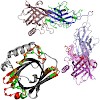
Biomolecular reagents that enable the specific molecular recognition of proteins play a crucial role in basic research as well as medicine. Up to now, antibodies (immunoglobulins) have been widely used for this purpose. Their predominant feature is the vast repertoire of antigen-binding sites that arise from a set of 6 hypervariable loops. However, antibodies ...
04-May-2009

CIPSM ist „Ausgewählter Ort im Land der Ideen“. Damit ist CIPSM Teil der Veranstaltungsreihe „365 Orte im Land der Ideen“, die gemeinsam von der Standortinitiative „Deutschland – Land der Ideen“ und der Deutschen Bank durchgeführt wird. Als „Ausgewählter Ort“ wird CIPSM unter der Schirmherrschaft von Bundespräsident Horst Köhler im Jahr 2009 Deutschland als das ...
01-May-2009
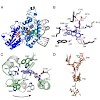
Archae possess unique biochemical systems quite distinct from the pathways present in eukaryotes and eubacteria. 7,8-Dimethyl-8-hydroxy-5deazaflavin (F0) and F420 are unique deazaflavin-containing coenzyme and methanogenic signature molecules, essential for a variety of biochemical transformations associated with methane biosynthesis and light-dependent DNA ...
29-Apr-2009
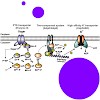
Proteins EINtr, NPr and IIANtr form a phosphoryl group transfer chain (Ntr-PTS) working in parallel to the phosphoenolpyruvate:carbohydrate phosphotransferase system (transport-PTS) in Escherichia coli. Recently, it was shown that dephosphorylated IIANtr binds and inhibits TrkA, a low-affinity potassium transporter. Here we report that the Ntr-PTS also regulates ...
28-Apr-2009
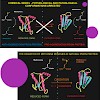
Prion disease is characterized by the α→β structural conversion of the cellular prion protein (PrPC) into the misfolded and aggregated “scrapie” (PrPSc) isoform. It has been speculated that methionine (Met) oxidation in PrPC may have a special role in this process, but has not been detailed and assigned individually to the 9 Met residues of full-length, ...
24-Apr-2009
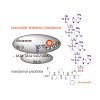
Translation of specific small peptides on the ribosome can confer resistance to macrolide antibiotics. To reveal the molecular details of this and related phenomena, stable RNA-peptide conjugates that mimic peptidyl-tRNA would be desirable, especially for ribosome structural biology. A flexible solid-phase synthesis strategy now allows efficient access to these ...
23-Apr-2009
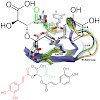
In this Letter, we report the natural products salvianolic acid A, salvianolic acid B, and caftaric acid as inhibitors of the protein–protein interactions mediated by the SH2 domains of the Src-family kinases Src and Lck, two established disease targets. Moreover, we propose a binding mode for the inhibitors based on molecular modeling, which will facilitate ...
23-Apr-2009
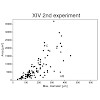
Human mesenchymal stem cells (hMSC) are a heterogeneous cell population, which is reflected in varying morphological and biological properties. Three subpopulations with intrinsic characteristics can be distinguished: small rapidly self-renewing cells, spindle-shaped cells and large, flattened cells. Unfortunately, it has neither been possible to morphologically ...
21-Apr-2009
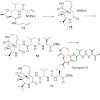
Syrbactins, a family of natural products belonging either to the syringolin or glidobactin class, are highly potent proteasome inhibitors. Although sharing similar structural features, they differ in their macrocyclic lactam core structure and exocyclic side chain. These structural variations critically influence inhibitory potency and proteasome subsite ...
20-Apr-2009
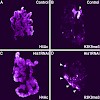
Although tremendous progress has been made toward identifying factors that regulate nucleosome structure and positioning, the mechanisms that regulate higher-order chromatin structure remain poorly understood. Recent studies suggest that the ISWI chromatin-remodeling factor plays a key role in this process by promoting the assembly of chromatin containing histone ...
19-Apr-2009
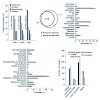
We describe a method, filter-aided sample preparation (FASP), which combines the advantages of in-gel and in-solution digestion for mass spectrometry–based proteomics. We completely solubilized the proteome in sodium dodecyl sulfate, which we then exchanged by urea on a standard filtration device. Peptides eluted after digestion on the filter were pure, allowing ...
17-Apr-2009
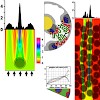
We show that the nuclear architecture of rod photoreceptor cells differs fundamentally in nocturnal and diurnal mammals. The rods of diurnal retinas possess the conventional architecture found in nearly all eukaryotic cells, with most heterochromatin situated at the nuclear periphery and euchromatin residing toward the nuclear interior. The rods of nocturnal ...
16-Apr-2009
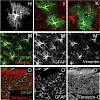
Astrocytes play many pivotal roles in the adult brain, including their reaction to injury. A hallmark of astrocytes is the contact of their endfeet with the basement membrane surrounding blood vessels, but still relatively little is known about the signaling mediated at the contact site. Here, we examine the role of ß1-integrin at this interface by its ...
15-Apr-2009
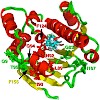
We determine the binding mode of a macrocyclic radicicol-like oxime to yeast HSP90 by combining computer simulations and experimental measurements. We sample the macrocyclic scaffold of the unbound ligand by parallel tempering simulations and dock the most populated conformations to yeast HSP90. Docking poses are then evaluated by the use of binding free energy ...
14-Apr-2009
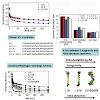
The transmembrane domains of fusion proteins are known to be functionally important and display an overabundance of helix-destabilizing Ile and Val residues. In an effort to systematically study the relationship of fusogenicity and helix stability, we had previously designed LV-peptides, a low-complexity model system whose hydrophobic core consists of Leu and Val ...
14-Apr-2009
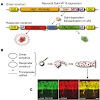
Our aging society is confronted with a dramatic increase of patients suffering from tauopathies, which include Alzheimer disease and certain frontotemporal dementias. These disorders are characterized by typical neuropathological lesions including hyperphosphorylation and subsequent aggregation of TAU protein and neuronal cell death. Currently, no mechanism-based ...
08-Apr-2009
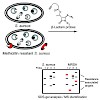
With the development of antibiotic resistant bacterial strains, infectious diseases have become again a life threatening problem. One of the reasons for this dilemma is the limited number and breadth of current therapeutic targets for which several resistance strategies have evolved over time. To identify resistance associated targets and to understand their ...
07-Apr-2009

Magnetofection, gene delivery under the influence of a magnetic field, is a technique to increase transfection efficiency by enforcing gene vector contact with a target cell. Mechanisms of magnetic lipoplex internalization and intracellular details of magnetofection are still unknown. In this study, cellular dynamics of magnetic lipoplexes were examined in real ...
07-Apr-2009
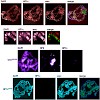
HP1 is a major component of chromatin and regulates gene expression through its binding to methylated histone H3. Most eukaryotes express at least three isoforms of HP1 with similar domain architecture. However, despite the common specificity for methylated histone H3, the three HP1 isoforms bind to different regions of the genome. Most of the studies so far ...
03-Apr-2009

Ischemic cardiomyopathy is one of the main causes of death, which may be prevented by stem cell-based therapies. SDF-1a is the major chemokine attracting stem cells to the heart. Since SDF-1a is cleaved and inactivated by CD26/dipeptidylpeptidase IV (DPP-IV), we established a therapeutic concept— applicable to ischemic disorders in general—by combining genetic ...
03-Apr-2009

Cyclic nucleotide-regulated cation channels are ion channels whose activation is regulated by the direct binding of cAMP or cGMP to the channel protein. Two structurally related families of channels regulated by cyclic nucleotides have been identified, the cyclic nucleotide-gated channels and the hyperpolarization-activated cyclic nucleotide-gated channels. ...
01-Apr-2009
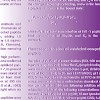
Molecular chaperones of the heat shock protein 70 (Hsp70) family play a crucial role in the presentation of exogenous antigenic peptides by antigen-presenting cells (APCs). In a combined biochemical and immuno-logical approach, we characterize the biochemical interaction of tumor-associated peptides with human Hsp70 and show that the strength of this interaction ...
01-Apr-2009
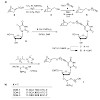
Nitrile oxides react smoothly and rapidly with norbornene-modified DNA in a copper-free click reaction. The reaction allows high density functionalization of oligodeoxyribonucleotides (ODNs) with a large variety of molecules directly on solid supports and even in synthesizers without the need for an additional catalyst.
31-Mar-2009
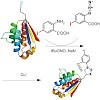
Upon development of radioimmunoassay techniques,[1] radioiodination of peptides and proteins has gradually become an indispensable tool for controlling and monitoring protein and peptide functions in vivo and in vitro, and for studying ligand–receptor interactions, ligand uptake and clearance. In addition, protein iodination has developed into a useful technique ...
31-Mar-2009
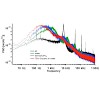
The spring constant of cantilever in atomic force microscopy (AFM) is often calibrated from thermal noise spectra. Essential for accurate implementation of this “thermal noise method” is an appropriate fitting function and procedure. Here, we survey the commonly used fitting functions and examine their applicability in a range of environments. We find that ...
23-Mar-2009
2009 is great! If you have time, take 5 minutes to watch CIPSM on silverscreen. english german
23-Mar-2009
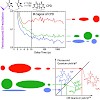
Photoreactions induced by ultraviolet radiation are among the most important external hazards for the integrity of DNA.1 The photolesion with the highest abundance is the [2 + 2] photoaddition of thymine bases adjacent on a DNA strand.2 This photoaddition yields a cyclobutane pyrimidine dimer (CPD). The formation of the CPD lesion has first been described in ...
11-Mar-2009
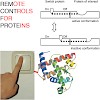
Chemical biology has multiple aims,[1] one of which is the identification of small-molecule modulators for individual functions of as many human proteins as possible. Various approaches towards this goal have been developed, which converge to create a toolbox of small molecules for chemical biologists.[2–4] This endeavor constitutes a long and winding road, ...
10-Mar-2009
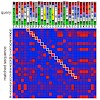
Sequence alignment and database searching are essential tools in biology because a protein’s function can often be inferred from homologous proteins. Standard sequence comparison methods use substitution matrices to find the alignment with the best sum of similarity scores between aligned residues. These similarity scores do not take the local sequence context ...
04-Mar-2009

Due to the specificity of Watson–Crick base pairing, DNA is an excellent molecule for the fabrication of nanostructures. It has been shown that DNA can be used as a scaffold for positioning proteins and synthetic molecules with nanometer accuracy. As the next step in adding complexity and functionality to these nanodevices, optical addressability is incorporated. ...
02-Mar-2009

Saghatelian and colleagues recently introduced a global metabolite-profiling approach that allows protein-metabolite interactions (PMI) to be identified. This approach represents an excellent strategy and valuable tool for unraveling the many secrets of the metabolome. The key features of the methodology will be summarized here.
01-Mar-2009
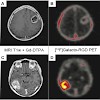
Inhibitors targeting the integrin {alpha}vβ3 are promising new agents currently tested in clinical trials for supplemental therapy of glioblastoma multiforme (GBM). The aim of our study was to evaluate 18F-labeled glycosylated Arg-Gly-Asp peptide ([18F]Galacto-RGD) PET for noninvasive imaging of {alpha}vβ3 expression in patients with GBM, suggesting eligibility ...
01-Mar-2009
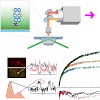
The molecular chaperone heat-shock protein 90 (Hsp90) is one of the most abundant proteins in unstressed eukaryotic cells. Its function is dependent on an exceptionally slow ATPase reaction that involves large conformational changes. To observe these conformational changes and to understand their interplay with the ATPase function, we developed a single-molecule ...
27-Feb-2009
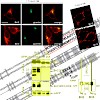
Intramembrane proteolysis is now widely recognized as an important physiological pathway required for reverse signaling and membrane protein degradation. Aspartyl intramembrane cleaving proteases of the GXGD-type play an important regulatory role in health and disease. Besides -secretase/presenilin, signal peptide peptidase (SPP) and SPP-like (SPPL) peptidases ...
23-Feb-2009
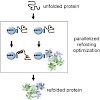
Matrix refolded: The formation of inclusion bodies, which are amorphous aggregates of misfolded insoluble protein, during recombinant protein expression, is one of the biggest bottlenecks in protein science. We report a stepwise, rational optimization procedure for refolding of insoluble proteins (see scheme). In comparison to refolding in-solution, this ...
23-Feb-2009
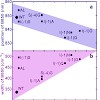
The peripheral antenna complex (LH2) of wild type and mutants of the LH2 α-subunit of purple bacterium Rhodobacter sphaeroides are investigated by transient and stationary absorption spectroscopy. The time for energy transfer from the bacteriochlorophyll (BChl) molecules B800 to B850 is found to depend on the mutation and varies between 0.7 ps for wild type LH2 ...
22-Feb-2009
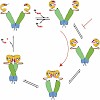
The molecular chaperone heat-shock protein 90 (Hsp90) couples ATP hydrolysis to conformational changes driving a reaction cycle that is required for substrate activation. Recent structural analysis provided snapshots of the open and closed states of Hsp90, which mark the starting and end points of these changes. Using fluorescence resonance energy transfer ...
20-Feb-2009
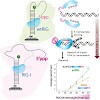
RIG-I is a cytosolic multi-domain protein that detects viral RNA and elicits an antiviral immune response. Two N-terminal caspase activation and recruitment domains (CARDs) transmit the signal and the regulatory domain prevents signaling in the absence of viral RNA. 5’-triphosphate and double stranded (ds) RNA are two molecular patterns that enable RIG-I to ...
19-Feb-2009
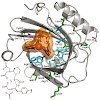
Human lipocalin 2 (Lcn2), also known as neutrophil gelatinase-associated lipocalin (NGAL), which naturally scavenges bacterial ferric siderophores, has been engineered to specifically bind rare-earth and related metal ions as chelate complexes with [(R)-2-amino-3-(4-aminophenyl)propyl]-trans-(S,S)-cyclohexane-1,2-diaminepentaacetic acid (p-NH(2)-Bn-CHX-A''-DTPA). ...
19-Feb-2009
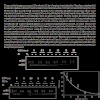
Many metabolic processes essential for plant viability take place in mitochondria. Therefore, mitochondrial function has to be carefully balanced in accordance with the developmental stage and metabolic requirements of the cell. One way to adapt organellar function is the alteration of protein composition. Since most mitochondrial proteins are nuclear encoded, ...
19-Feb-2009
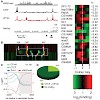
For the compact Drosophila genome, several factors mediating insulator function, such as su(Hw) and dCTCF, have been identified. Recent analyses showed that both these insulator-binding factors are functionally dependent on the same cofactor, CP190. Here we analysed genome-wide binding of CP190 and dCTCF. CP190 binding was detected at CTCF, su(Hw) and GAF sites ...
16-Feb-2009
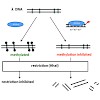
The cytidine analogue 5-fluoro-2-deoxycytidine (dCF) is a mechanism-based inhibitor of DNA methyltransferases. We report the synthesis of short 18-mer dsDNA oligomers containing a triple-hemimethylated CpG motive as a recognition sequence for the human methyltransferase Dnmt1. The DNA strands carry within these CpG islands dCF building blocks that function as ...
14-Feb-2009
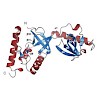
The Tudor-SN protein (p100, SND1) has been implicated in a variety of cellular processes, such as transcription, processing of edited double-stranded RNA, and splicing regulation. Molecular details of these functions are not yet understood. Tudor domains have previously been shown to bind methylated ligands, such as methylated lysines and arginines. It has been ...
Wavelength and solvent independent photochemistry: the electrocyclic ring-closure of indolylfulgides
11-Feb-2009

A wavelength and solvent dependent study of a photochromic indolylfulgide is presented. The ring-closure reaction is characterized using stationary and time-resolved spectroscopy with femtosecond time resolution. After excitation into the first excited singlet state (S1) the photoprocesses proceed on ultrafast timescales (0.3–0.45 ps) in both polar and non-polar ...
10-Feb-2009
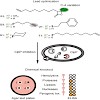
With decreasing efficiency of antibiotic therapies against hospital- and community-acquired bacterial pathogens, the treatment of infectious diseases again represents a tremendous challenge for medicinal research. This challenge seems to be particularly difficult if one considers the sophisticated resistance strategies, which are effective against almost all ...
10-Feb-2009
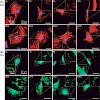
We herein present a novel platform of well-controlled ordered and disordered nanopatterns positioned with a cyclic peptide of arginine-glycine-aspartic acid (RGD) on a bioinert poly(ethylene glycol) background, to study whether the nanoscopic order of spatial patterning of the integrin-specific ligands influences osteoblast adhesion. This is the first time that ...
10-Feb-2009
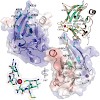
RIG-I and MDA5 sense cytoplasmic viral RNA and set-off a signal transduction cascade, leading to antiviral innate immune response. The third RIG-Ilike receptor, LGP2, differentially regulates RIG-Iand MDA5-dependent RNA sensing in an unknown manner. All three receptors possess a C-terminal regulatory domain (RD), which in the case of RIG-I senses the viral ...
08-Feb-2009
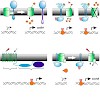
In order to adapt to ever changing environmental conditions, bacteria sense environmental stimuli, and convert them into signals that are transduced intracellularly. Several mechanisms have evolved by which receptors transmit signals across the cytoplasmic membrane. Stimulus perception may trigger receptor dimerization and/or conformational changes. Another ...
05-Feb-2009
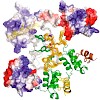
Protein import into peroxisomes depends on a complex and dynamic network of protein–protein interactions. Pex14 is a central component of the peroxisomal import machinery and binds the soluble receptors Pex5 and Pex19, which have important function in the assembly of peroxisome matrix and membrane, respectively. We show that the N-terminal domain of Pex14, ...
05-Feb-2009
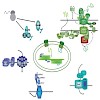
Chloroplast and mitochondria, the two organelles with an accepted endosymbiotic origin, have developed multiple translocation pathways to ensure the subcellular allocation of proteins synthesized by cytosolic ribosomes, and to guarantee their assembly into functional complexes in coordination also with organellar-encoded subunits. The evolution of different ...
04-Feb-2009
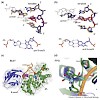
Selective base pairing of the four canonical nucleobases is fundamental for the integrity of the genetic system. Information loss associated with DNA damage is a constant challenge and in response, organisms have evolved specialized defence systems consisting of DNA repair and lesion tolerance. DNA repair requires the action of different lesion recognition ...
04-Feb-2009
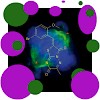
Polo-like kinases (Plks) are a conserved family of serine/threonine kinases.[1, 2] The family member Plk1 is a key regulator of mitosis[1, 2] and has been identified as a negative prognostic marker for tumor patients.[3, 4] The widespread recognition of Plk1 as a therapeutic target for the treatment of human tumors has triggered numerous drug discovery ...
02-Feb-2009
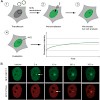
Mammalian cells are constantly threatened by multiple types ofDNAlesions arising from various sources like irradiation, environmental agents, replication errors or by-products of the normal cellular metabolism. If not readily detected and repaired these lesions can lead to cell death or to the transformation of cells giving rise to life-threatening diseases like ...
01-Feb-2009
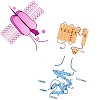
Hyperpolarization-activated and cyclic nucleotide-gated (HCN) channels belong to the superfamily of voltage-gated pore loop channels. HCN channels are unique among vertebrate voltage-gated ion channels, in that they have a reverse voltage-dependence that leads to activation upon hyperpolarization. In addition, voltage-dependent opening of these channels is ...
01-Feb-2009
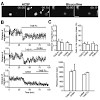
Adult neuronal precursors retain the remarkable capacity to migrate long distances from the posterior (subventricular zone) to the most anterior [olfactory bulb (OB)] parts of the brain. The knowledge about the mechanisms that keep neuronal precursors in the migratory stream and organize this long-distance migration is incomplete. Here we show that blood vessels ...
01-Feb-2009
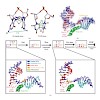
RNA polymerase II (Pol II) is the eukaryotic enzyme that is responsible for transcribing all protein-coding genes into messenger RNA (mRNA). The mRNA-transcription cycle can be divided into three stages: initiation, elongation and termination. During elongation, Pol II moves along a DNA template and synthesizes a complementary RNA chain in a processive manner. ...
31-Jan-2009
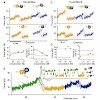
Single-molecule force spectroscopy allows superb mechanical control of protein conformation. We used a custom-built low-drift atomic force microscope to observe mechanically induced conformational equilibrium fluctuations of single molecules of the eukaryotic calcium-dependent signal transducer calmodulin (CaM). From this data, the ligand dependence of the full ...
31-Jan-2009
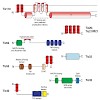
It is widely accepted that chloroplasts derived from an endosymbiotic event in which an early eukaryotic cell engulfed an ancient cyanobacterial prokaryote. During subsequent evolution, this new organelle lost its autonomy by transferring most of its genetic information to the host cell nucleus and therefore became dependent on protein import from the cytoplasm. ...
30-Jan-2009
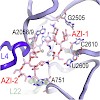
Azithromycin is a semisynthetic derivative of erythromycin that inhibits bacterial protein synthesis by binding within the peptide exit tunnel of the 50S ribosomal subunit. Nevertheless, there is still debate over what localization is primarily responsible for azithromycin binding and as to how many molecules of the drug actually bind per ribosome. In the present ...
30-Jan-2009
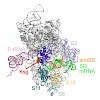
In this issue of Molecular Cell, Kaberdina et al. (2009) show that prolonged exposure of ribosomes to the antibiotic kasugamycin triggers the spontaneous loss of small subunit proteins and produces a reduced ribosomal particle that exclusively translates leaderless mRNAs.
27-Jan-2009
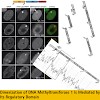
DNA methylation is a major epigenetic modification and plays a crucial role in the regulation of gene expression. Within the family of DNA methyltransferases (Dnmts), Dnmt3a and 3b establish methylation marks during early development, while Dnmt1 maintains methylation patterns after DNA replication. The maintenance function of Dnmt1 is regulated by its large ...
23-Jan-2009
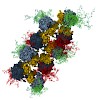
Recent advances have led to insights into the structure of the bacterial ribosome, but little is knownabout the 3D organization of ribosomes in the context of translating polysomes. We employed cryoelectron tomography and a template-matching approach to map 70S ribosomes in vitrified bacterial translation extracts and in lysates of active E. coli spheroplasts. In ...
22-Jan-2009
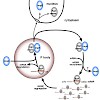
Small regulatory RNAs including small interfering RNAs (siRNAs) and microRNAs (miRNAs) guide Argonaute (Ago) proteins to specific target RNAs leading tomRNA destabilization or translational repression. Here, we report the identification of Importin 8 (Imp8) as a component of miRNA-guided regulatory pathways. We show that Imp8 interacts with Ago proteins and ...
21-Jan-2009

γ-Secretase is a unique intramembrane-cleaving protease complex, which cleaves the Alzheimer′s disease-associated b-amyloid precursor protein (APP) and a number of other type I membrane proteins. Human γ-secretase consists of the catalytic subunit presenilin (PS) (PS1 or PS2), the substrate receptor nicastrin, APH-1 (APH-1a or APH-1b), and PEN-2. To facilitate ...
21-Jan-2009
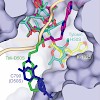
Ketolides represent the latest generation of macrolide antibiotics, displaying improved activities against some erythromycin resistant strains, while maintaining their activity against erythromycin susceptible ones. In this study we present a new ketolide K-1325 that carries an alkyl-aryl side chain at C-13 of the lactone ring. According to our genetic and ...
15-Jan-2009
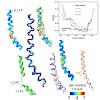
The backbone structure is determined by site-directed spin labeling, double electron electron resonance measurements of distances, and modeling in terms of a helix-loop-helix construct for a transmembrane domain that is supposed to line the translocation pathway in the 54.3 kDa Naþ/proline symporter PutP of Escherichia coli. The conformational distribution of the ...
15-Jan-2009
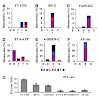
DNA replication across blocking lesions occurs by translesion DNA synthesis (TLS), involving a multitude of mutagenic DNA polymerases that operate to protect the mammalian genome. Using a quantitative TLS assay, we identified three main classes of TLS in human cells: two rapid and error-free, and the third slow and error-prone. A single gene, REV3L, encoding the ...
14-Jan-2009
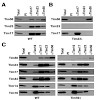
Transport of essentially all matrix and a number of inner membrane proteins is governed, entirely or in part, by N-terminal presequences and requires a coordinated action of the translocases of outer and inner mitochondrial membranes (TOM and TIM23 complexes). Here, we have analyzed Tim50, a subunit of the TIM23 complex that is implicated in transfer of ...
14-Jan-2009
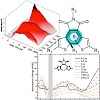
The dynamics of the ring-closure reaction of three different bis(thiophen-3-yl)maleimides are investigated using ultrafast spectroscopy in the visible range. The structures of the molecules differ with respect to substitution of the thiophene ring and the maleimide. The experiments reveal reaction kinetics which point to the population of an excited electronic ...
08-Jan-2009
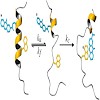
Coupling fast triplet–triplet energy transfer (TTET) between xanthone and naphthylalanine to the helix–coil equilibrium in alanine-based peptides allowed the observation of local equilibrium fluctuations in α-helices on the nanoseconds to microseconds time scale. The experiments revealed faster helix unfolding in the terminal regions compared with the central ...
07-Jan-2009

We present a simple, non-radioactive assay for DNA methyltransferase activity and DNA binding. As most proteins are studied as GFP fusions in living cells, we used a GFP binding nanobody coupled to agarose beads (GFP nanotrap) for rapid one-step purification. Immobilized GFP fusion proteins were subsequently incubated with different fluorescently labeled DNA ...
06-Jan-2009
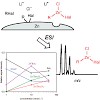
Tetrahydrofuran solutions of the products formed in LiCl-mediated zinc insertion reactions into various organic halides RHal were analyzed by anion-mode electrospray ionization (ESI) mass spectrometry. In all cases, organozincate anions were observed. The reactions with RHal, Hal ) Br and I, yielded predominantly mononuclear complexes, such as ZnRHal2 - and ...
04-Jan-2009

Four newly synthesized Hemithioindigo-based peptide-switches with changing meta/para-substitution-pattern within the stilbene-part of the molecule are characterized with time-resolved absorption spectroscopy. The different substances undergo a light-induced Z/E-isomerization: the reaction proceeds on a picosecond timescale with time constants <50 ps for the Z → E ...
02-Jan-2009

Structural investigations are frequently hindered by difficulties in obtaining diffracting crystals of the target protein. Here, we report the crystallization and structure solution of the U2AF homology motif (UHM) domain of splicing factor Puf60 fused to Escherichia coli thioredoxin A. Both modules make extensive crystallographic contacts, contributing to a ...
01-Jan-2009

Electroretinography (ERG) is an established diagnostic technique in clinical ophthalmology and provides objective information about retinal function. This technique is also applied in basic research, where animal models of hereditary retinopathies have significantly contributed to our understanding of the composition of ERG responses in general and how retinal ...
28-Nov-2008
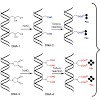
Silver-plated DNA: The deposit of a thin metal layer on biomolecules, such as DNA, requires the formation of small, magic-sized metal nuclei. Through the careful design of a reducing chemical functionality in the form of a dialdehyde, the nucleation process and thus the metallization step can be controlled.
22-Oct-2008
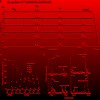
Histone modifications play an important role in shaping chromatin structure. Here, we describe the use of an in vitro chromatin assembly system from Drosophila embryo extracts to investigate the dynamic changes of histone modifications subsequent to histone deposition. In accordance with what has been observed in vivo, we find a deacetylation of the initially ...
19-Mar-2008
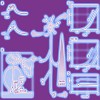
Hyperpolarization-activated cyclic nucleotide-gated (HCN) channels comprise a small subfamily of proteins within the superfamily of pore-loop cation channels. In mammals, the HCN channel family comprises four members (HCN1-4) that are expressed in heart and nervous system. The current produced by HCN channels has been known as Ih (or If or Iq). Ih has also been ...










